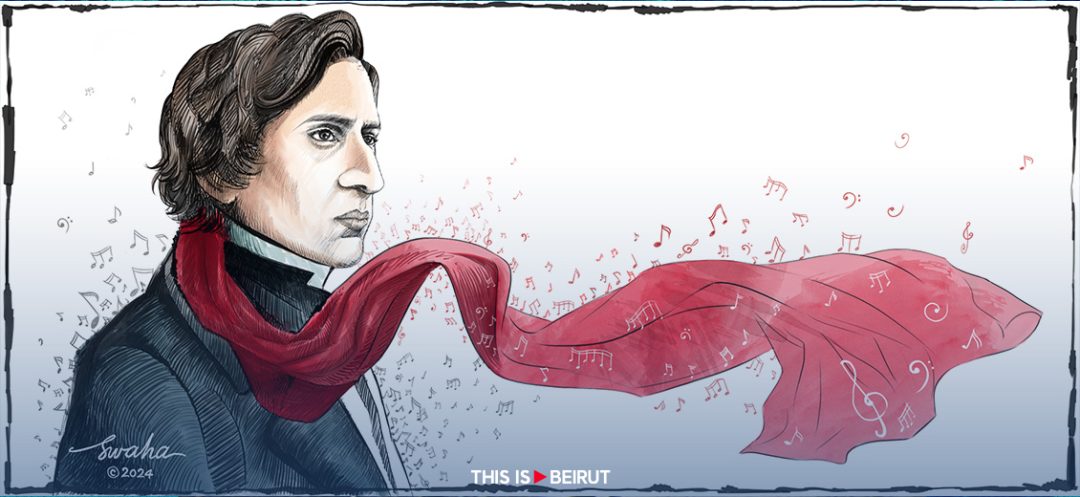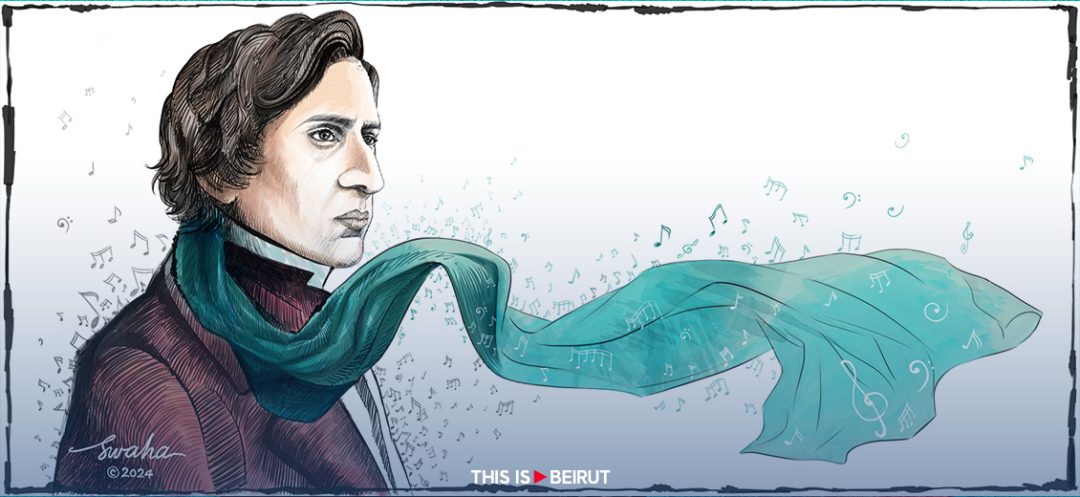Listen to the article
Among the luminaries of 19th-century European music, Frédéric Chopin (1810-1849) stands out as the undisputed “poet of the piano.” He deliberately focused on the piano, the king of instruments, to delve into and elevate the nuanced emotions of Romantic music—ranging from passion and melancholy to rebellion, despair and exuberance. His musical vision was enriched with bold sensitivities, a melancholic charm, lyrical outpourings, the intoxication of rhythm and passion, a resplendent heroic fervor, as well as precious and tender harmonies. “One recognizes him even in the silences by his breathless respiration,” as Robert Schumann noted. Furthermore, Chopin affirmed himself as the bard of Poland, his native country, suffering under oppression during the 19th century. Thus, Chopin’s musical genius became a poignant voice in Poland’s quest for freedom and national identity, echoing the nation’s aspirations and struggles. Beyond his musical genius and revolutionary impact, it is the masterful fusion of virtuosity with profound expressiveness that characterizes Chopin’s unparalleled legacy in the classical music world.
On the occasion of the commemoration of Chopin’s birth on March 1st, Swiss musicologist Jean-Jacques Eigeldinger, one of the world’s most eminent specialists on the Polish composer, pays tribute to the messiah of Romantic music in an exclusive interview with This Is Beirut.
Chopin’s remains are buried in Paris, at the Père Lachaise cemetery. However, the composer’s heart, which was removed from his body after his death, is preserved, at his request, in a crystal flask filled with cognac in Warsaw, in his beloved Poland. This duality between his final resting place and his deep attachment to his homeland is manifested not only in his burial but also in every work he composed. How did the oppression experienced by Poland influence Chopin’s music, and how does this influence appear in his compositions marked by extreme melancholy?
Originally, the Polonaise was a dance of the aristocracy, and the Mazurka a popular dance (or dance song). With the prince musician M.K. Ogiński, the Polonaise for piano had taken on a character that was sometimes heroic, sometimes melancholic (The Farewells to the Homeland), of victory or defeat. Chopin would remember this in the pairing of his Opus 40 with its triumphant Polonaise in A major of the “military” genre (no. 1), coupled with the one in C minor (no. 2) bent by defeat. A conquering pride animates the famous “Heroic” Polonaise Op. 53, while the ultimate Polonaise-Fantaisie Op. 61 represents a beyond of the genre—somewhat the myth of all Polands. The Mazurka, whose character and accentuation vary according to the provinces, was acclimatized in cultured music notably by Elsner and Maria Szymanowska. Moreover, Fryderyk, as a teenager, breathed in an attachment to the land in the countryside of Szafarnia. Ethnomusicologists will long discuss a contribution—direct or not—in Chopin’s output.
Eloquent for us is this passage from a letter to his family (summer of 1845): “I am always with one foot at your place and the other in the next room where the lady of the house [G. Sand at Nohant] works and, at the moment, not at all at my place but, as usual, in strange worlds. These are certainly imaginary spaces but I feel no shame in it. Is it not said among us: ‘He went in imagination to the coronation?’ And I am madly a true Mazovian, so I have composed three new Mazurkas [Op. 59] without further thought.”
What emerges from this text is a nostalgia for home, family, friends and masters: in a word, homesickness. Chopin was filled with żal throughout his life and his condition as an exile. But this did not make him into a man who would go down to the street with the idea of demonstrating; he was rather the bard of the aristocratic circle gathered around Prince Adam Czartoryski—equivalent to a Polish king in exile. Thus, Wilhelm von Lenz could write (1872), “He represented Poland, his homeland as he dreamed it, in the Parisian salons under Louis-Philippe, a salon that his point of view allowed him to regard as a political reference. Chopin was the only political pianist. He played Poland, he put Poland to music!”
In the shadow of artistic and cultural decadence in the era of globalization, art undergoes a profound transformation, and music, including the interpretation of Chopin’s works, is not spared. From the glorious era of Arturo Benedetti Michelangeli, Arthur Rubinstein and Alfred Cortot to contemporary masters such as Martha Argerich, Nelson Freire and Dominique Merlet, the interpretation of Chopin has evolved. However, some pianists seem to stray from the subtleties and emotions that Chopin had infused into his creations. How do you perceive the current level of interpretation of Chopin’s music?
Alfred Cortot remains an unparalleled genius in the interpretation of Chopin. His passion, his sound imagination, his humanist culture, his vision of the work, his constantly renewed momentum make him a unique figure. The two occasions when, as a teenager, I had the happiness to hear him in recital, continue to spread their sound light of a lighthouse always illuminating: the first time in Chopin (Sonata in B minor; 4 Ballades) and Schumann alternately; the second in tribute to Schumann alone (centenary of 1956): Symphonic Studies, Scenes from Childhood, Kreisleriana, Carnival. As an encore: The Prophet Bird! Perhaps Cortot will have reached an interpretative summit in Schumann, the chosen one of his heart, who offered him the privilege of joining musical and literary elements; he deeply felt the need to connect sound and word, enriching one through the other.
In turn heroic or charming, King Arthur (Rubinstein) dominates from above, as for him, the repertoire of Polonaises and Waltzes. Among current pianists, Eugen Indjic has delivered Mazurkas of inimitable charm and natural elegance; this sometimes happens to Piotr Anderszewskiv—even better in Szymanowska’s Mazurkas. Dominique Merlet shows a sharp requirement in his concern for authenticity with respect to the musical text, a concern he has transmitted through his teaching. The young pianist François Dumont harmoniously combines simplicity, fluidity and personal commitment in the Ballades, Nocturnes and Impromptus.
Clearly, the multiple musical competitions of our time dominate in the distribution of cards, something that cannot suit all artistic sensitivities. Compared to previous generations, ours seems to slide from the domain of interpretation to that of execution. Symptomatic in this regard is the multiplication of Master Classes that tend to replace (?) the old course of interpretation.
Another direction characteristic of our time is the return to chamber music (string quartet or quintet) to support the pianist in the two concertos and other works conceived with orchestra accompaniment. This fortunate alternative often goes hand in hand with the resurgence of the fortepiano (copies or restored originals) from various epochs and manufactures in the idea of approaching the sound aesthetics of the classical, romantic and post-romantic periods. Some results prove sometimes convincing—insofar as they manage to free themselves somewhat from the sacrosanct “historically informed.”
Music exerts a cathartic effect on its audience. Can Chopin’s work, through the emotional power it conveys, be considered to have the potential to soothe the torments of the human soul and, by extension, of humanity as a whole?
Orpheus, the legendary musician-poet, had brought civilization (arts, agriculture) to barbaric tribes. May the technological barbarism of our time be pierced by the transcendental essence of music. Chopin certainly counts for much in this.




